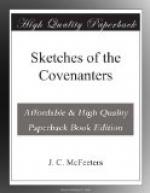The Roman hierarchy, having gained a foothold on the shores of Scotland, pushed hard for the ascendancy. At length the Papal religion prevailed. The black wings of apostasy, as of an ominous bird, were stretched from sea to sea. Dense darkness fell upon Scotland. The Thirteenth century was the horrible midnight, during which the people slept helpless in the grasp of a terrorizing nightmare. Kings combined with priests to crush all who asserted their right to a free conscience in the worship of God. The Bible was officially condemned and publicly burned; its perusal by the people was accounted a crime worthy of death. Poor Scotland! how ruinously overwhelmed beneath the briny waters of adversity.
The providences of God are mysterious. We become mystified and distressed when we ask for reasons. God’s circles are vast; we cannot take in His horizon. We know however that all His works are done in truth and righteousness. The wheels of Christ’s chariot never move backward. In getting over the rough places, progress may seem to be reversed, yet this is an illusion. In every such case the mysterious operation of providence is merely preparation for advancement. The great work of redemption goes forward through all stages to perfection. The storms that dash against the face of spring prevent not the coming of summer with its abundant harvests and songs of joy.
The light of the Gospel seemed to have been quenched beneath the seething tide of Papal corruption. Still there were incorruptible men and women here and there, who devoutly worshiped God according to His Word. Their hearthstone was their church. There may have been many in those days deeply rooted in the faith, but for most part they remained invisible. To be known as true to Christ imperiled life. Not many had the courage to publish their convictions. Yet there were some who arose in the majesty of redeemed manhood and confessed Jesus, testifying to His truth in defiance of the powers of darkness. To them truth was sweeter than life.
John Resby is on record as one among the first witnesses, who heralded a glorious reformation for Scotland. He was a voice crying in the wilderness, proclaiming the sovereignty of Christ over the Church and denouncing the pope who claimed to be the representative of the Lord Jesus. He was quickly silenced by death at the stake. This occurred in 1407 The spirit of religious liberty was thereby crushed and disappeared for twenty-five years.
Paul Craw was the next to be lifted into prominence by the power of the Gospel, and thrust into publicity by the courage of his convictions. The Spirit of the Lord came mightily upon him. His love for the truth of the Gospel filled him with abhorrence of Roman errors; his pity for souls carried him into the fight for their freedom. He testified boldly against Papal idolatry, prayer to saints, and the confessional. For this he was sentenced to suffer in the flames. His martyrdom took place in 1432.




